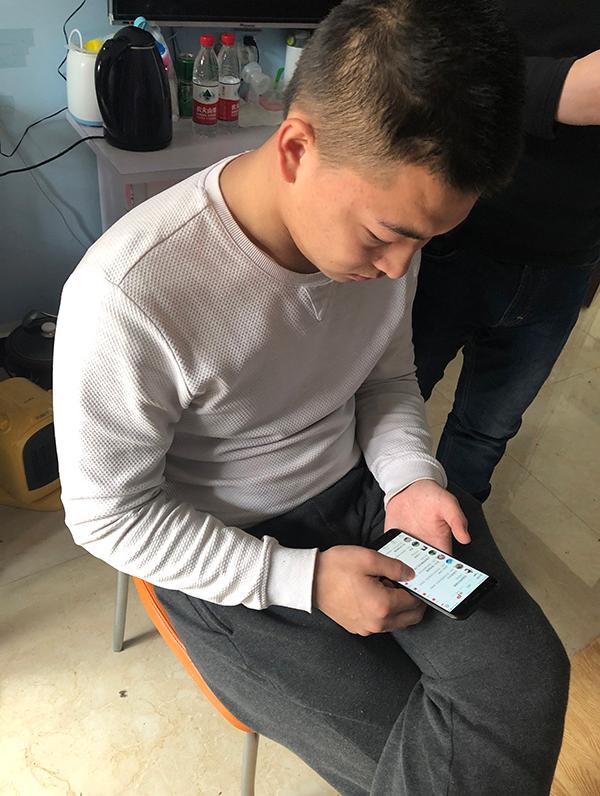


Zhao Yu [photo: Chinanews.com]
Local procuratorate announced on Thursday it has decided not to prosecute a man who was detained for intentional assault injury after stopping an attempted rape of his female neighbor.
Zhao Yu, 21, was accused of causing severe injury to others out of negligence, according to The Beijing News citing local police and was handed over to Jinan district procuratorate in Fuzhou, East China’s Fujian Province.
Considering all the evidence of the incident and that Zhao was trying to stop an illegal infringement, the district procuratorate made the decision to encourage righteous acts and promote social morals, read the announcement by Fuzhou Public Security on Thursday.
Zhao's case should be handled as a civil case and should be spared from criminal liability due to his motive to rescue his neighbor, surnamed Zou, Xu Xin, a professor at the Beijing Institute of Technology's School of Law, told the Global Times Wednesday.
Zhao, a migrant worker in Fuzhou, said he heard cries from downstairs on December 26 night and went to check, but only to find a man, surnamed Li, who was trying to rape a woman, surnamed Zou, Beijing-based Legal Daily reported on Wednesday.
Trying to rescue Zou, Zhao kicked Li on the stomach, which damaged Li's internal organs and caused a secondary disability.
Zhao was detained by local police on January 29 for intentional assault and was released on bail on February 10 after the local procuratorate rejected his arrest.
Zou, the woman, said Li knocked her out with a chair and attempted to remove her clothes, according to local Fuzhou television station.
However, Li told the media that he was just standing by the door when Zhao kicked him for unknown reasons. Li was playing mahjong when reached by reporters.
The incident has made a splash on Chinese social media. Many expressed support for Zhao, and complained about unfair situations where "the good people in jail while the rape suspect gets to play mahjong."
Zhao is not the only one who attempted to help others but ended up in legal disputes. Difficulty in defining Good Samaritan acts or similar behavior is at the core of such cases, experts said.
 Fire brigade in Shanghai holds group wedding
Fire brigade in Shanghai holds group wedding Tourists enjoy ice sculptures in Datan Town, north China
Tourists enjoy ice sculptures in Datan Town, north China Sunset scenery of Dayan Pagoda in Xi'an
Sunset scenery of Dayan Pagoda in Xi'an Tourists have fun at scenic spot in Nanlong Town, NW China
Tourists have fun at scenic spot in Nanlong Town, NW China Harbin attracts tourists by making best use of ice in winter
Harbin attracts tourists by making best use of ice in winter In pics: FIS Alpine Ski Women's World Cup Slalom
In pics: FIS Alpine Ski Women's World Cup Slalom Black-necked cranes rest at reservoir in Lhunzhub County, Lhasa
Black-necked cranes rest at reservoir in Lhunzhub County, Lhasa China's FAST telescope will be available to foreign scientists in April
China's FAST telescope will be available to foreign scientists in April "She power" plays indispensable role in poverty alleviation
"She power" plays indispensable role in poverty alleviation Top 10 world news events of People's Daily in 2020
Top 10 world news events of People's Daily in 2020 Top 10 China news events of People's Daily in 2020
Top 10 China news events of People's Daily in 2020 Top 10 media buzzwords of 2020
Top 10 media buzzwords of 2020 Year-ender:10 major tourism stories of 2020
Year-ender:10 major tourism stories of 2020 No interference in Venezuelan issues
No interference in Venezuelan issues
 Biz prepares for trade spat
Biz prepares for trade spat
 Broadcasting Continent
Broadcasting Continent Australia wins Chinese CEOs as US loses
Australia wins Chinese CEOs as US loses